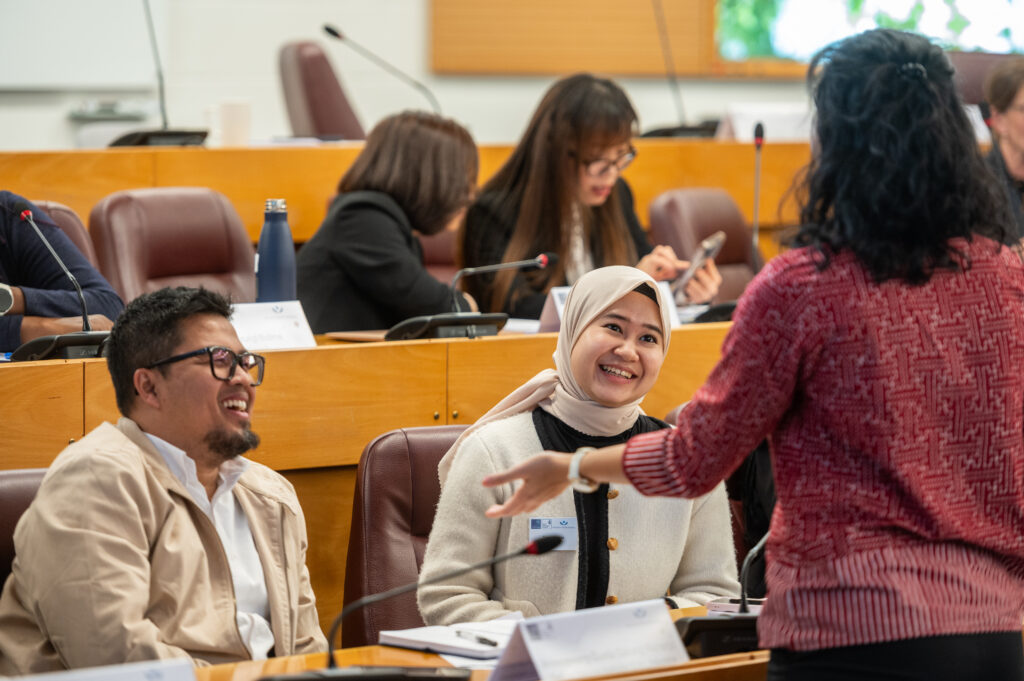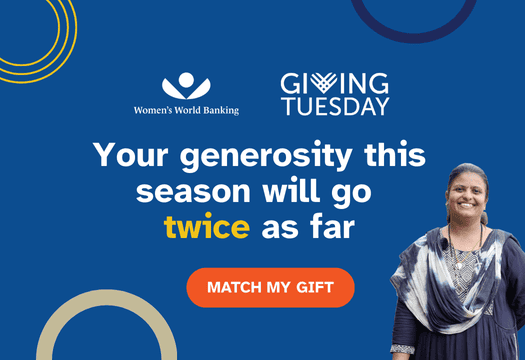By Louiza Kaluna, Program Coordinator, Leadership and Diversity
If women were full economic participants, global GDP would rise by 26%. Amid changing political landscapes globally given national elections in 74 countries in 2025, women’s financial inclusion represents a valuable opportunity. The financial services sector stands as a constant force for meeting private sector goals and ensuring positive impacts on women customers. Women’s access to financial resources is key to their economic participation, contributing to national development and the advancement of social equality. This is not just a matter of personal empowerment; it’s about leveraging financial inclusion to stabilize economies and create more inclusive societies.
This year, as Women’s World Banking engages with more than 40 senior-level policymakers and regulators through our Leadership and Diversity Program for Regulators, we are seeing the deep engagement and strong commitment to women’s financial inclusion as a tool for achieving economic and social goals.
A global policy focus on women’s access to finance
Women’s World Banking’s Leadership and Diversity Program for Regulators (LDR), delivered in partnership with Oxford Saïd Business School, kicked off with enthusiasm for the economic, financial, and social power of women’s use of savings, payments, insurance, and credit. We are proud to bring together a dynamic and diverse group of women leaders from countries as varied as Lesotho, Nigeria, Tajikistan, Armenia, Indonesia, and Cambodia.
The program’s cohort includes high-level senior officials, including deputy governors, CEOs, and other functional heads from various regulatory bodies. These senior leaders are joined by high-potential women leaders who participate in the policymaking process alongside them, engaging with leadership development topics throughout the program.
This year, we deliberately increased the number of male senior officials in the cohort, recognizing the critical role of allyship and diverse leadership in driving systemic change.
Participants are looking to strengthen their leadership skills as well as deepen their knowledge and expertise in women-centered design, policy formulation, and implementation. Working on policies of interest from their respective institutions, they will receive tailored advisory support throughout the program. This journey culminated in a week-long intensive in-person learning at Oxford University’s Saïd Business School, where key topics on leadership and inclusive policy design were explored in depth.
During the Oxford intensive, participants gained practical skills in persuasion, negotiation, and policy influence through dynamic sessions led by respected facilitators. The program also featured a compelling session with Baroness Catherine Ashton, who shared real-life leadership dilemmas and personal insights on navigating complex decision-making environments. Participants spent significant time networking with one another and engaging directly with keynote speakers, leaders in finance, policy, and global development, creating a vibrant space for peer learning and collaboration. The week proved both energizing and transformative, equipping participants with sharpened leadership tools and renewed clarity of purpose in advancing financial inclusion for women.

The value of women’s access to finance for policymakers, regulators, and supervisors
This year’s cohort holds that women’s financial sector access is not only a social goal, but a fundamental issue for global growth. Enabling women to participate in financial systems drives macroeconomic growth and economic resilience. Studies consistently show that when women have access to financial services such as savings, credit, insurance, and digital payment systems, they invest in the well-being and resilience of their households, contributing to broader economic and social well-being If women were participating in markets the same way men do, the current global GDP would rise by 26%, or $28 trillion. Expanding women’s access to finance unlocks vast market opportunities, strengthens economic growth, and enhances the stability of financial systems. Women-led businesses are often more innovative and customer-focused, particularly in underserved markets; for example, firms led by women in India accessed larger loans (INR 673K vs. INR 615K) and had lower default rates (3.5% vs. 5%) than those led by men. Yet they continue to face lending bias. It also boosts financial resilience and reduces dependency on aid, making women’s financial participation a smart investment for both private and public sectors.
Take credit, for example. Improved access to credit empowers women to start and expand small businesses, driving entrepreneurship and job creation in their communities. Oftentimes, financial service providers and policymakers assume that women’s businesses will stay smaller than men’s even with access to finance. However, research in India shows that with access to capital, women business owners hire just as many employees as men business owners. Several studies in Latin America and Southeast Asia also show that once the obstacle to access to finance is removed, businesses flourish. Over 20% of firms that adopted digital credit saw an increase in the number of paid workers employed. Therefore, women’s financial participation directly increases demand for goods and services in local communities and beyond, creating new market opportunities in sectors like retail, healthcare, education, and technology.
The Leadership and Diversity Program for Regulators is made possible through financial support from the Swiss State Secretariat for Economic Affairs (SECO) and Visa Foundation. The program was designed in partnership with Oxford University Saïd Business School and the Alliance for Financial Inclusion (AFI). Scholarships are generously funded by the Alliance for Financial Inclusion (AFI), the Centre of Excellence on Gender-smart Solutions (CoE), the European Bank for Reconstruction and Development (EBRD), the Gates Foundation, and the Australian Government Department of Foreign Affairs and Trade (DFAT). The dedication of all these institutions to policy that drives innovation, inclusion, and growth plays a pivotal role in enabling the program to equip regulators with the knowledge, tools, and resources needed to create lasting change in their regions.
With continued collaboration from our partners and supporters, we are confident that the LDR 2025 cohort will make meaningful strides in women’s access to and use of finance worldwide. This year’s program is not just a year-long initiative; it represents a sustained commitment to empowering women, driving systemic change, and shaping a future where financial inclusion advances both private sector innovation and national development goals.
Through the dedication and leadership of this remarkable cohort, we are excited to witness the transformation of financial landscapes across the globe.




